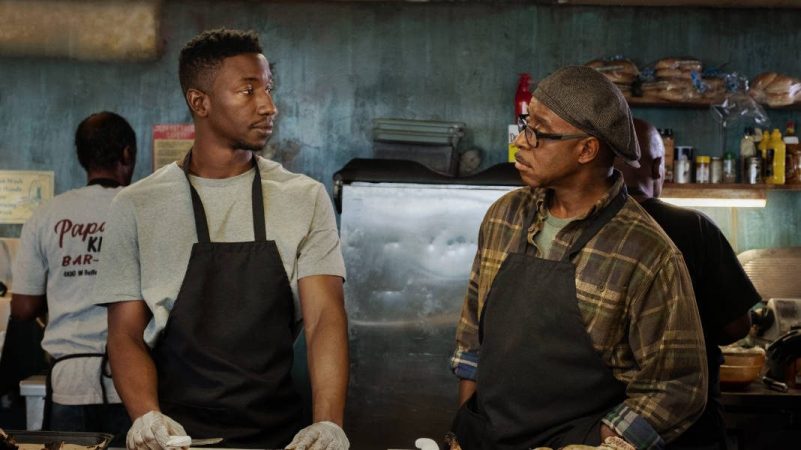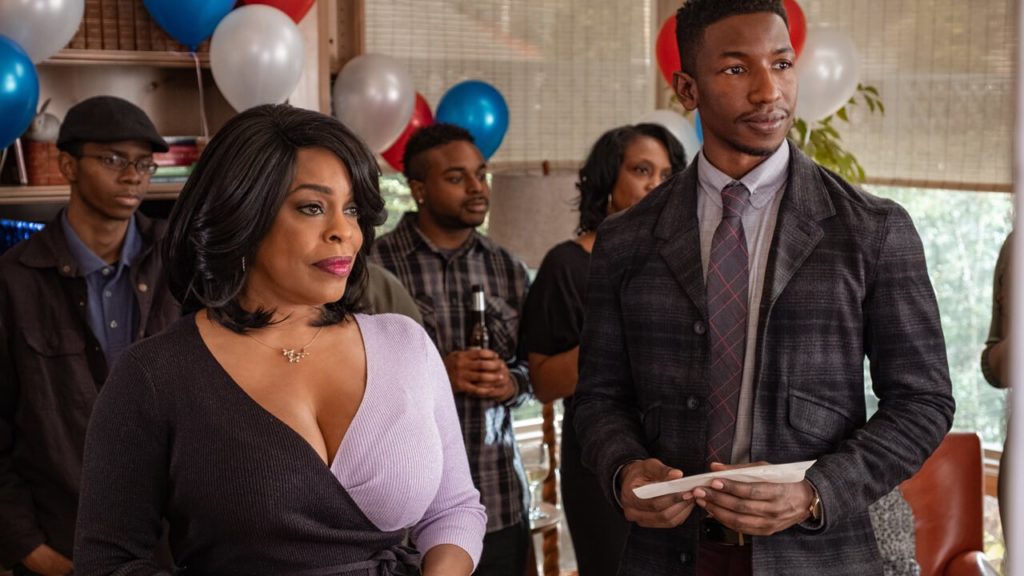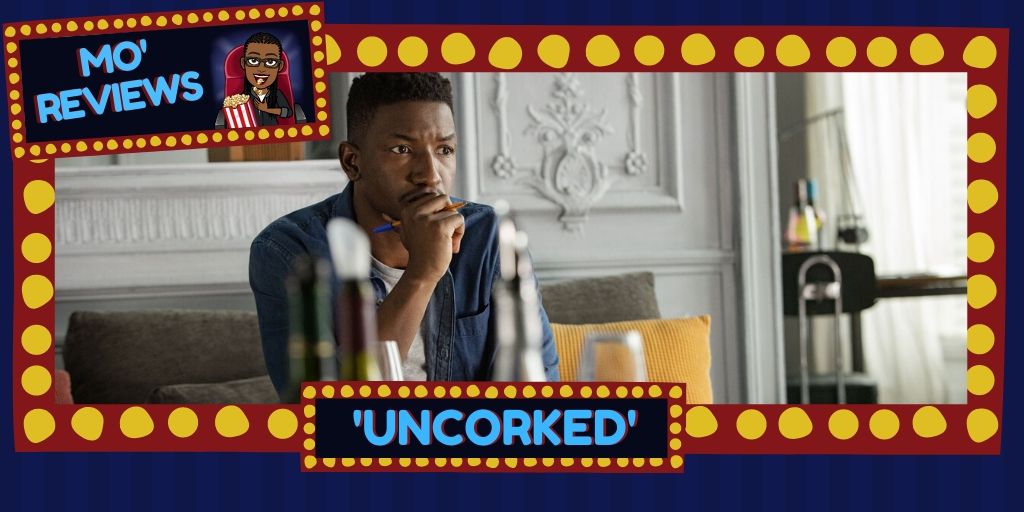Mamadou Athie in Uncorked. Photo credit: Netflix
Directed by: Prentice Penny
Written by: Prentice Penny
Starring: Courtney B. Vance, Mamadou Athie, Niecy Nash, Kelly Jenrette, Sasha Compère, Matt McGorry, Meera Rohit Kumbhani, Gil Ozeri
Monique’s Review:
Spoilers Ahead
One of Netflix’s newest films, Uncorked, is a little bit of a bait-and-switch. Depending on how you view the film, that switcheroo could be a good or bad thing, with the ending acting as a Rorschach test for viewers. The fact that I am still confused and a little bothered by the ending is exactly why I’m bringing it up in the beginning of this review, since my feelings about the ending color how I feel about the rest of the film.
In short, I didn’t like how the ending gave us an unfinished story after investing us in nearly two hours’ worth of Elijah’s (Athie) personal struggles, including his tense relationship with his well-meaning but stern father Louis (Vance), his love for his highly supportive and ailing mother Sylvia (Nash), and his burgeoning relationship with his girlfriend Tanya (Compère). The intensity between Elijah and Louis stem from Elijah’s love for wine, so much so that he wants to become a master sommelier. But Louis wants Elijah to take over the family business, the local barbecue joint in Memphis, Tennessee.
The film has all the trappings of a good family drama—with the build-up of tension between father and son, you expect the two have a blow-up, with Louis finally realizing that he needs to support Elijah’s dream, and with Elijah finally getting that sommelier’s pin. Along with reconciliation, I also expected for Elijah and Louis to join forces and make a huge barbecue and wine restaurant, changing the Memphis eatery scene forever. Some of this happens.

What I didn’t expect was the film to take the tried-and-true formula and turn it on its head a little. This is where viewers might diverge from the film depending on what they were expecting to watch. If you are expecting a neatly-tied film with everything working out in the end, that’s not exactly what you get from this film. You get hints of things working out, but it’s left up to you to decide if that’s the case.
As for me, I’d like to think Elijah finally got to his goal of sommelier, but with so much set up about his character—him being a flake according to his father, who voices his irritation at Elijah starting and stopping so many goals in his life—it’s a tough call to make. Hopefully, with Elijah actually going back to sommelier school after a series of unfortunate events (including family tragedy), it seems like Elijah has finally found something he’s going to stick with.
The ending could also be taken as a more realistic one. Even when there’s tragedy—the death of Elijah’s mother, in this case–which can spur us into action, it’s up to us individually to meet our own goals. Just because tragedy happens doesn’t mean we will find the chutzpah to push ourselves. Perhaps, by having Elijah going back to school on his own terms, the film breaks away from what could have been seen as another “fridging” of a female character to make the male counterparts finally achieve greatness.

Penny himself gives his reasoning for the unresolved ending in a Collider interview, saying:
“To me, it was kind of the point of the movie, right? Which is, you don’t always get what you’re trying to go after. That’s really the point is the dad kind of says to him earlier on in the movie, he is sort of wisely saying, ‘You never stick with anything. When things get hard, you give up.’ And what he’s really trying to do is grow his son into a man, right? The dad believes that that will happen by teaming up for this restaurant and becoming more stable, and that’s sort of the thing. And the son’s journey is really, ‘Hey, when things don’t go your way, how do you respond when things get really tough?’
That’s also being a man, and so I was playing with this interesting thing to me, which is like, it’s very ironic that the very way he has to become a man is by separating himself from his father and still going after what he wants, which is kind of the point, right? It’s never really about when you get it because a lot of times in life, you don’t get the thing. It’s what you do when you don’t get the thing that’s the most important part. That’s what makes you, I think, root for this character. You can put in hard work all the time, and it doesn’t necessarily mean anything. It’s really about saying more about you when you’re in the thinkings of failure than it does when you have the success. So that was just very key to me that he does not pass the test. That was just like, he can’t.”
Regardless of the debate viewers could have about the ending, the film is shot competently, however there are a few areas I have contention with. First is the choice of rap music. I understand Penny probably used rap music to make this film a definitely “Black” film. This is a film that doesn’t traffic in stereotypes, clearly, but Penny wanted to put a stamp on the movie that let viewers know that Black people are multilayered—we can be wine afficionados and mix in with affluent society while liking to turn up.
I have no issue with using rap to tell a story about wine. But what I do think is that using what sounds like stereotypical gangster rap (including the misogyny and other problematic trappings that have overshadowed a once-journalistic artform) gives the film mixed messaging. Is this a film about an average young Black man and his love for wine and family, or is it about how “hard” and “gangster” Memphis can be? Seeing how becoming a sommelier is the furthest thing from “gangster,” I feel like including gangster rap is trying too hard to give the film some street cred, or Black cred, or whatever. The film had enough within it to stand on its own. (If you want to listen to the songs in the film, which include more than just rap, check this out.)
and I feel like there was an over-reliance on artful establishing montages, especially for locations we had already been introduced to. Also, the over-produced establishing montages made every location, from Paris, France to the local skating rink to the wholesale wood lot, have the same level of importance, even though they didn’t with regard to the roles they play in the story.
This isn’t saying that Paris is more important culturally than a local hangout spot because of some Eurocentric reasoning. What I am saying is that while the skating rink is where Tanya and Elijah have their first date, Paris is where Elijah gets the bulk of his wine training. Since the film is more about Elijah’s soul-fulfilling goals, it stands to reason that Paris should get the montage over the skating rink. Similarly with the wood lot versus the family barbecue restaurant—the restaurant deserves the montage over the lot because the restaurant is where a good chunk of Elijah and Louis’ characterization and relationship struggles manifest.

I also felt like the film didn’t need the comic relief Ozeri’s Richie brought. Richie wasn’t so much funny as he was annoying, so I couldn’t particularly find the scamp-like charm I feel like I was expected to. On the flip side, I felt like McGorry’s character Harvard, one of Elijah’s more talented classmates, was played well and pushes Elijah to actually be better. Overall, the character was harmless enough, but I wonder if he was still too undefined.
At any rate, one of the things I liked the best about the film was that it was the closest I’ve heard to actually capturing the Black southern accent. Too often, the media perpetuates the idea that all southerners, regardless of race, talk the same, and that’s not true. As shown in this film, some people, like Elijah, have no discernible accent whatsoever, and others, like Louis and other members of Elijah’s family, do have what you might call “lazy tongues.” I looked Penny up online, and it says he was born in California, but I have to assume he has some southern roots in his family tree, since he had the presence of mind to present the Black southern accent as a multifaceted thing that presents itself uniquely in each Black southerner. As a Black southerner, I fully appreciate that.
Overall, Uncorked is a film that will test how you view the family drama. Perhaps it’ll even expand how you view it, depending on how you like the unresolved ending. I ask that you give it a watch and see for yourself.
